Analyzing the Impact of Social Media on Higher Education Students
VerifiedAdded on 2021/02/21
|7
|1922
|134
Essay
AI Summary
This essay delves into the multifaceted impact of social media on academic learning within higher education, particularly at the university level. It begins by defining learning and social media, highlighting their interconnectedness in the modern educational landscape. The essay then explores various social media platforms used by students, such as blogs, wikis, social bookmarking sites, and social networking sites like Facebook and Twitter, and discusses how these tools are utilized in the learning process. It further analyzes the impact of social media on students' academic lives, emphasizing its role in project completion and assignment. The essay provides a critical analysis of the positive and negative aspects of social media's influence on higher education, including enhanced access to information, improved collaboration, and potential distractions. It concludes by referencing academic sources that support these arguments.
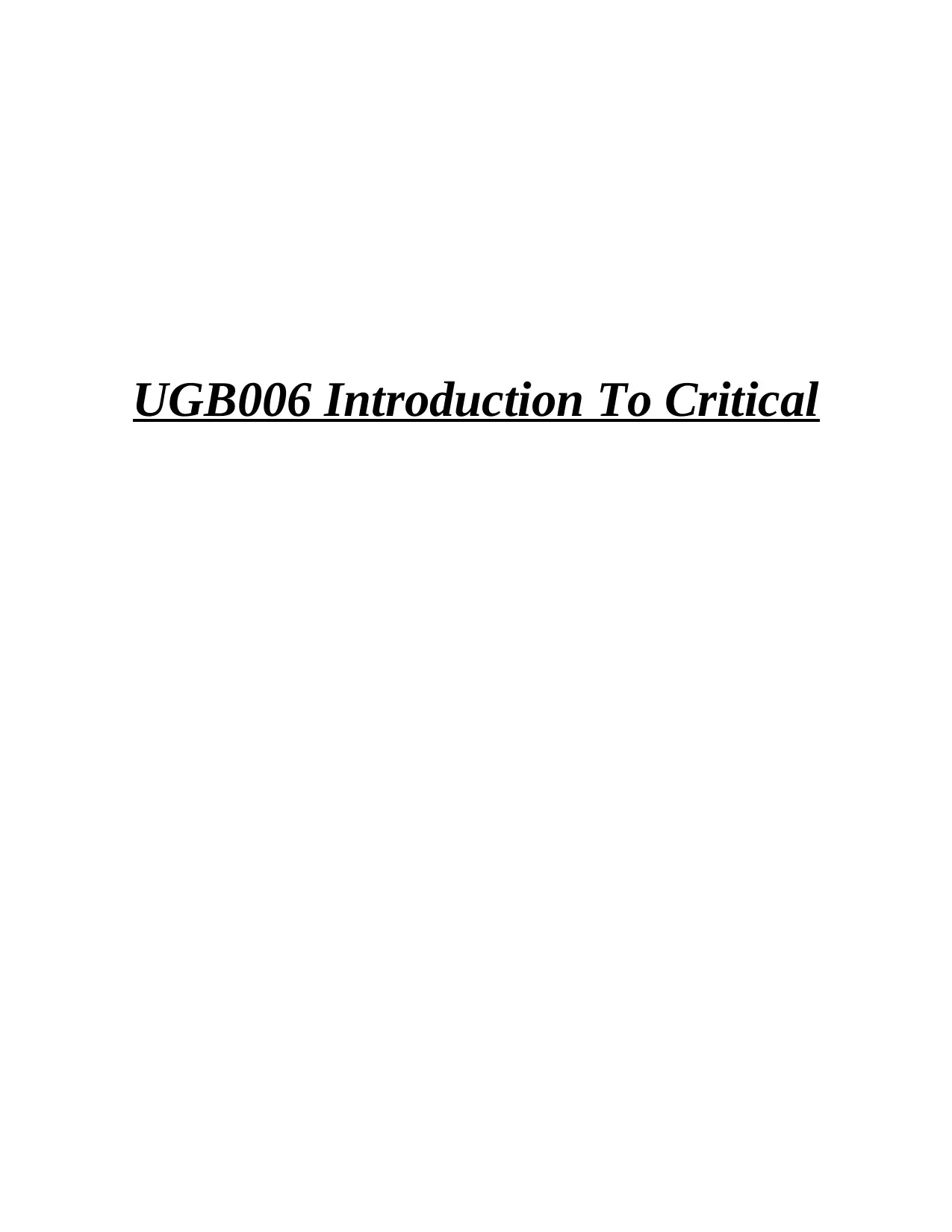
UGB006 Introduction To Critical
Paraphrase This Document
Need a fresh take? Get an instant paraphrase of this document with our AI Paraphraser
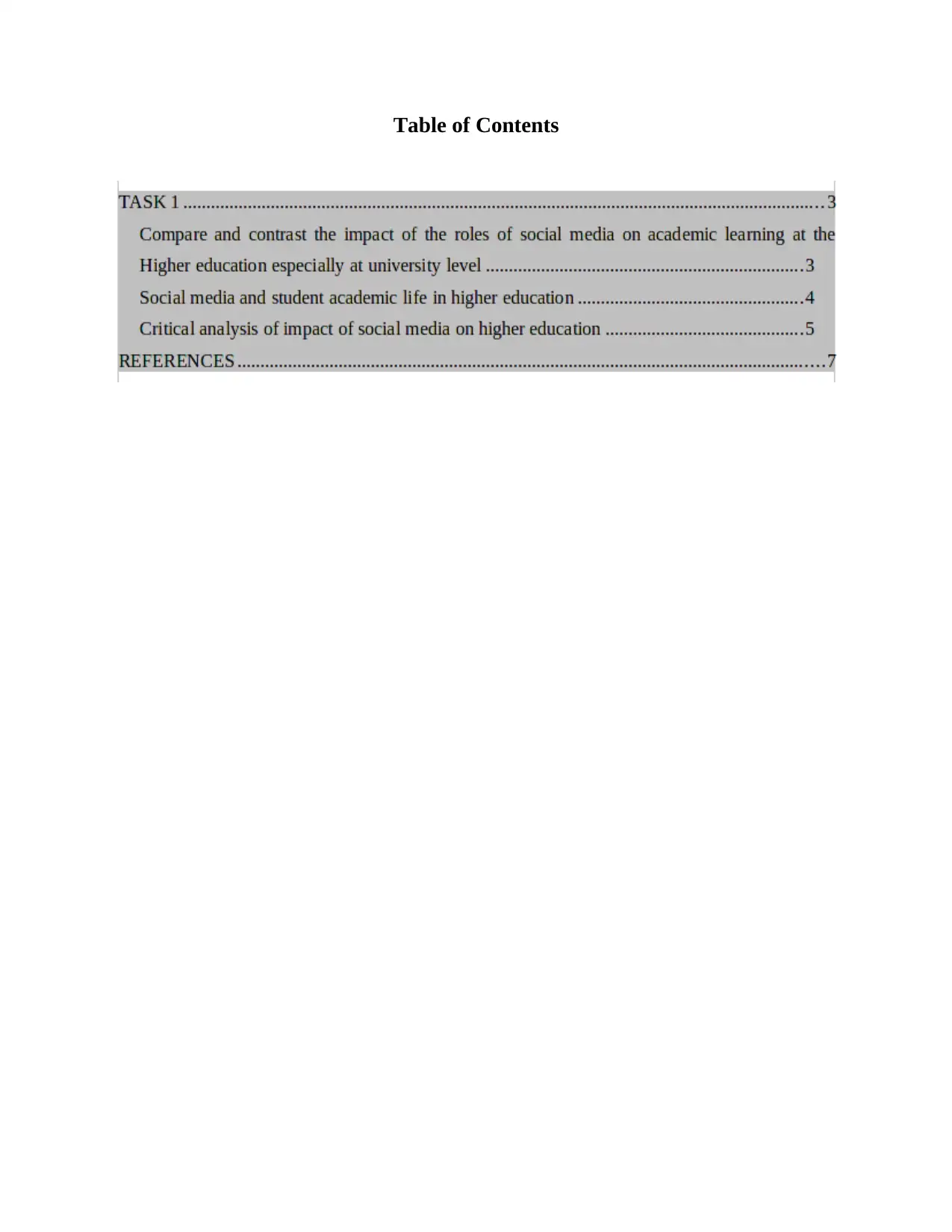
Table of Contents
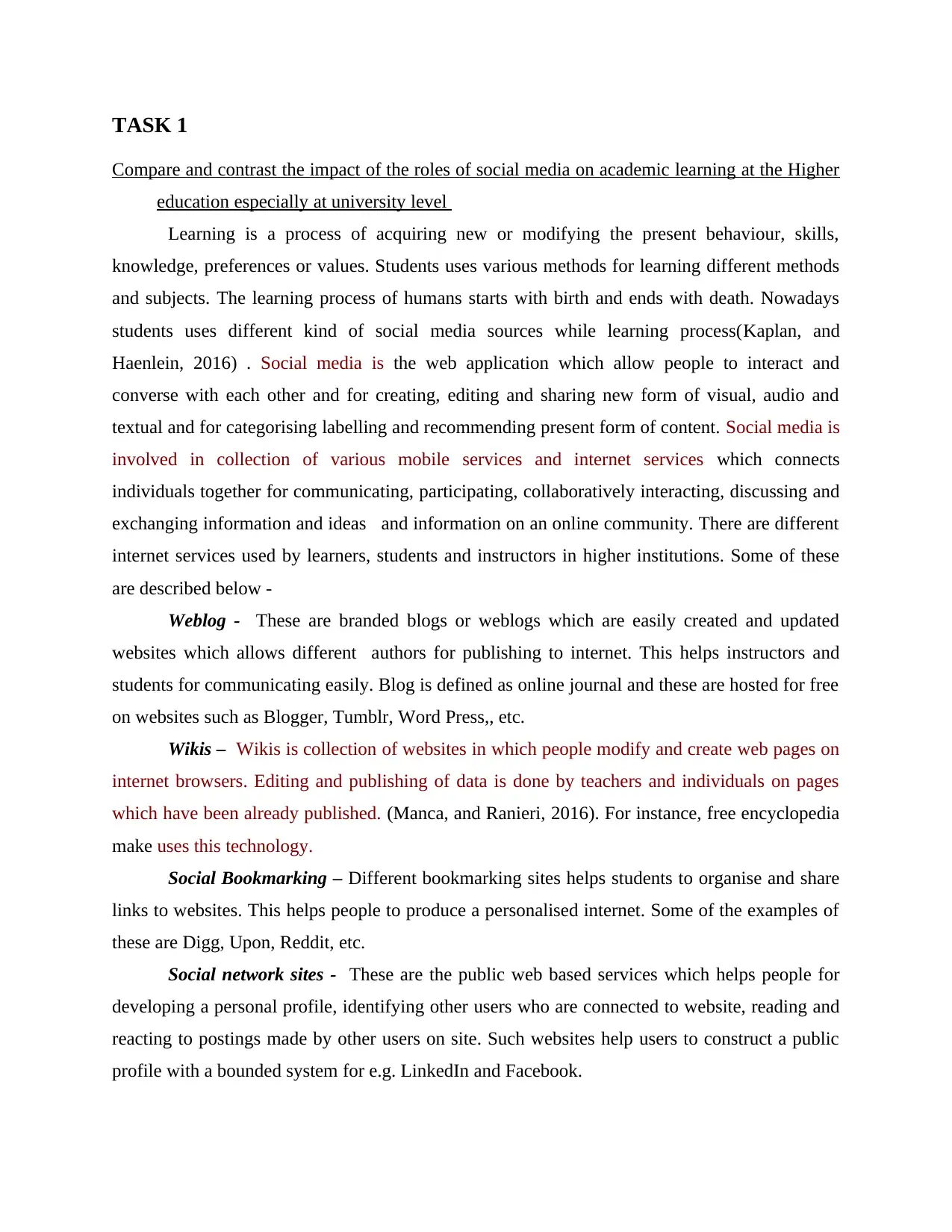
TASK 1
Compare and contrast the impact of the roles of social media on academic learning at the Higher
education especially at university level
Learning is a process of acquiring new or modifying the present behaviour, skills,
knowledge, preferences or values. Students uses various methods for learning different methods
and subjects. The learning process of humans starts with birth and ends with death. Nowadays
students uses different kind of social media sources while learning process(Kaplan, and
Haenlein, 2016) . Social media is the web application which allow people to interact and
converse with each other and for creating, editing and sharing new form of visual, audio and
textual and for categorising labelling and recommending present form of content. Social media is
involved in collection of various mobile services and internet services which connects
individuals together for communicating, participating, collaboratively interacting, discussing and
exchanging information and ideas and information on an online community. There are different
internet services used by learners, students and instructors in higher institutions. Some of these
are described below -
Weblog - These are branded blogs or weblogs which are easily created and updated
websites which allows different authors for publishing to internet. This helps instructors and
students for communicating easily. Blog is defined as online journal and these are hosted for free
on websites such as Blogger, Tumblr, Word Press,, etc.
Wikis – Wikis is collection of websites in which people modify and create web pages on
internet browsers. Editing and publishing of data is done by teachers and individuals on pages
which have been already published. (Manca, and Ranieri, 2016). For instance, free encyclopedia
make uses this technology.
Social Bookmarking – Different bookmarking sites helps students to organise and share
links to websites. This helps people to produce a personalised internet. Some of the examples of
these are Digg, Upon, Reddit, etc.
Social network sites - These are the public web based services which helps people for
developing a personal profile, identifying other users who are connected to website, reading and
reacting to postings made by other users on site. Such websites help users to construct a public
profile with a bounded system for e.g. LinkedIn and Facebook.
Compare and contrast the impact of the roles of social media on academic learning at the Higher
education especially at university level
Learning is a process of acquiring new or modifying the present behaviour, skills,
knowledge, preferences or values. Students uses various methods for learning different methods
and subjects. The learning process of humans starts with birth and ends with death. Nowadays
students uses different kind of social media sources while learning process(Kaplan, and
Haenlein, 2016) . Social media is the web application which allow people to interact and
converse with each other and for creating, editing and sharing new form of visual, audio and
textual and for categorising labelling and recommending present form of content. Social media is
involved in collection of various mobile services and internet services which connects
individuals together for communicating, participating, collaboratively interacting, discussing and
exchanging information and ideas and information on an online community. There are different
internet services used by learners, students and instructors in higher institutions. Some of these
are described below -
Weblog - These are branded blogs or weblogs which are easily created and updated
websites which allows different authors for publishing to internet. This helps instructors and
students for communicating easily. Blog is defined as online journal and these are hosted for free
on websites such as Blogger, Tumblr, Word Press,, etc.
Wikis – Wikis is collection of websites in which people modify and create web pages on
internet browsers. Editing and publishing of data is done by teachers and individuals on pages
which have been already published. (Manca, and Ranieri, 2016). For instance, free encyclopedia
make uses this technology.
Social Bookmarking – Different bookmarking sites helps students to organise and share
links to websites. This helps people to produce a personalised internet. Some of the examples of
these are Digg, Upon, Reddit, etc.
Social network sites - These are the public web based services which helps people for
developing a personal profile, identifying other users who are connected to website, reading and
reacting to postings made by other users on site. Such websites help users to construct a public
profile with a bounded system for e.g. LinkedIn and Facebook.
⊘ This is a preview!⊘
Do you want full access?
Subscribe today to unlock all pages.

Trusted by 1+ million students worldwide
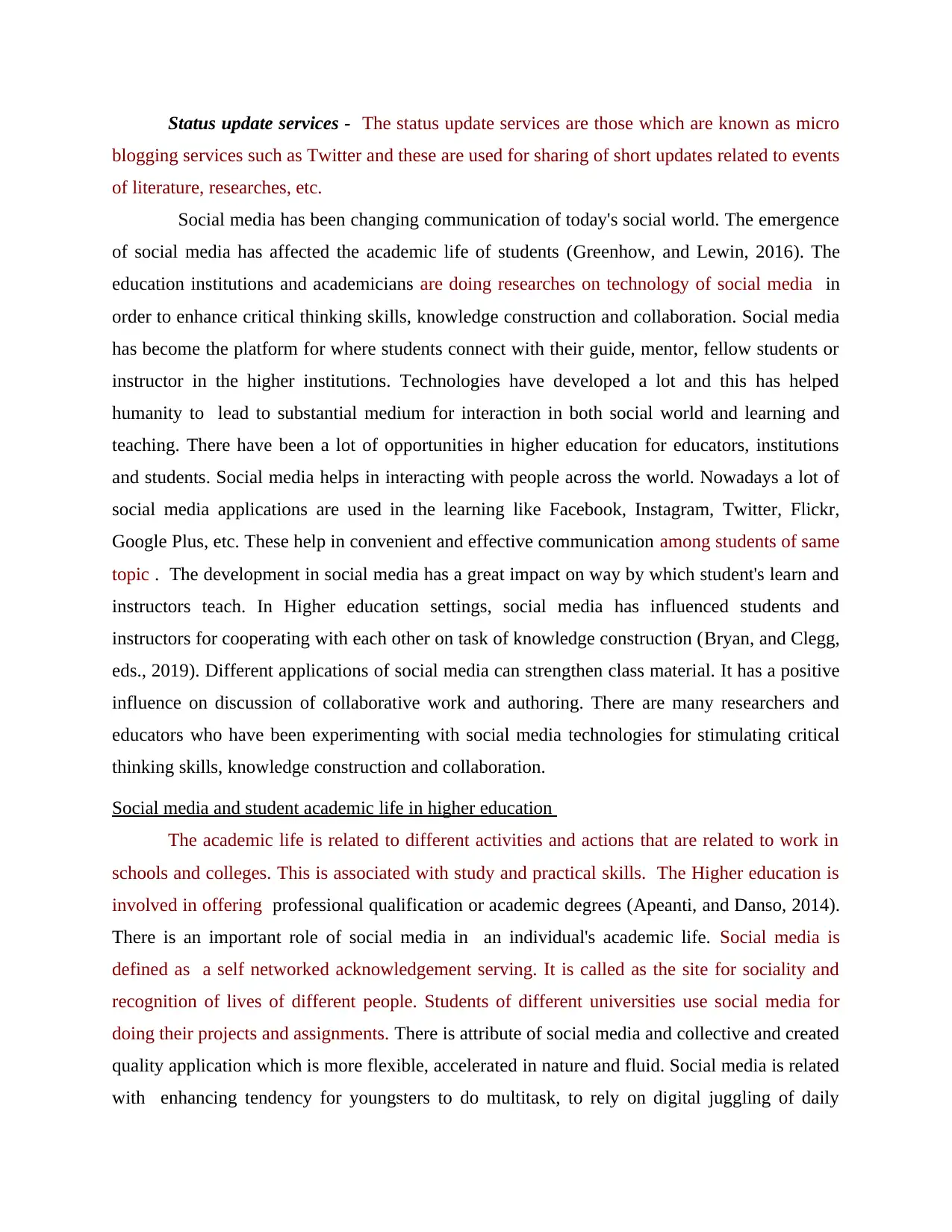
Status update services - The status update services are those which are known as micro
blogging services such as Twitter and these are used for sharing of short updates related to events
of literature, researches, etc.
Social media has been changing communication of today's social world. The emergence
of social media has affected the academic life of students (Greenhow, and Lewin, 2016). The
education institutions and academicians are doing researches on technology of social media in
order to enhance critical thinking skills, knowledge construction and collaboration. Social media
has become the platform for where students connect with their guide, mentor, fellow students or
instructor in the higher institutions. Technologies have developed a lot and this has helped
humanity to lead to substantial medium for interaction in both social world and learning and
teaching. There have been a lot of opportunities in higher education for educators, institutions
and students. Social media helps in interacting with people across the world. Nowadays a lot of
social media applications are used in the learning like Facebook, Instagram, Twitter, Flickr,
Google Plus, etc. These help in convenient and effective communication among students of same
topic . The development in social media has a great impact on way by which student's learn and
instructors teach. In Higher education settings, social media has influenced students and
instructors for cooperating with each other on task of knowledge construction (Bryan, and Clegg,
eds., 2019). Different applications of social media can strengthen class material. It has a positive
influence on discussion of collaborative work and authoring. There are many researchers and
educators who have been experimenting with social media technologies for stimulating critical
thinking skills, knowledge construction and collaboration.
Social media and student academic life in higher education
The academic life is related to different activities and actions that are related to work in
schools and colleges. This is associated with study and practical skills. The Higher education is
involved in offering professional qualification or academic degrees (Apeanti, and Danso, 2014).
There is an important role of social media in an individual's academic life. Social media is
defined as a self networked acknowledgement serving. It is called as the site for sociality and
recognition of lives of different people. Students of different universities use social media for
doing their projects and assignments. There is attribute of social media and collective and created
quality application which is more flexible, accelerated in nature and fluid. Social media is related
with enhancing tendency for youngsters to do multitask, to rely on digital juggling of daily
blogging services such as Twitter and these are used for sharing of short updates related to events
of literature, researches, etc.
Social media has been changing communication of today's social world. The emergence
of social media has affected the academic life of students (Greenhow, and Lewin, 2016). The
education institutions and academicians are doing researches on technology of social media in
order to enhance critical thinking skills, knowledge construction and collaboration. Social media
has become the platform for where students connect with their guide, mentor, fellow students or
instructor in the higher institutions. Technologies have developed a lot and this has helped
humanity to lead to substantial medium for interaction in both social world and learning and
teaching. There have been a lot of opportunities in higher education for educators, institutions
and students. Social media helps in interacting with people across the world. Nowadays a lot of
social media applications are used in the learning like Facebook, Instagram, Twitter, Flickr,
Google Plus, etc. These help in convenient and effective communication among students of same
topic . The development in social media has a great impact on way by which student's learn and
instructors teach. In Higher education settings, social media has influenced students and
instructors for cooperating with each other on task of knowledge construction (Bryan, and Clegg,
eds., 2019). Different applications of social media can strengthen class material. It has a positive
influence on discussion of collaborative work and authoring. There are many researchers and
educators who have been experimenting with social media technologies for stimulating critical
thinking skills, knowledge construction and collaboration.
Social media and student academic life in higher education
The academic life is related to different activities and actions that are related to work in
schools and colleges. This is associated with study and practical skills. The Higher education is
involved in offering professional qualification or academic degrees (Apeanti, and Danso, 2014).
There is an important role of social media in an individual's academic life. Social media is
defined as a self networked acknowledgement serving. It is called as the site for sociality and
recognition of lives of different people. Students of different universities use social media for
doing their projects and assignments. There is attribute of social media and collective and created
quality application which is more flexible, accelerated in nature and fluid. Social media is related
with enhancing tendency for youngsters to do multitask, to rely on digital juggling of daily
Paraphrase This Document
Need a fresh take? Get an instant paraphrase of this document with our AI Paraphraser
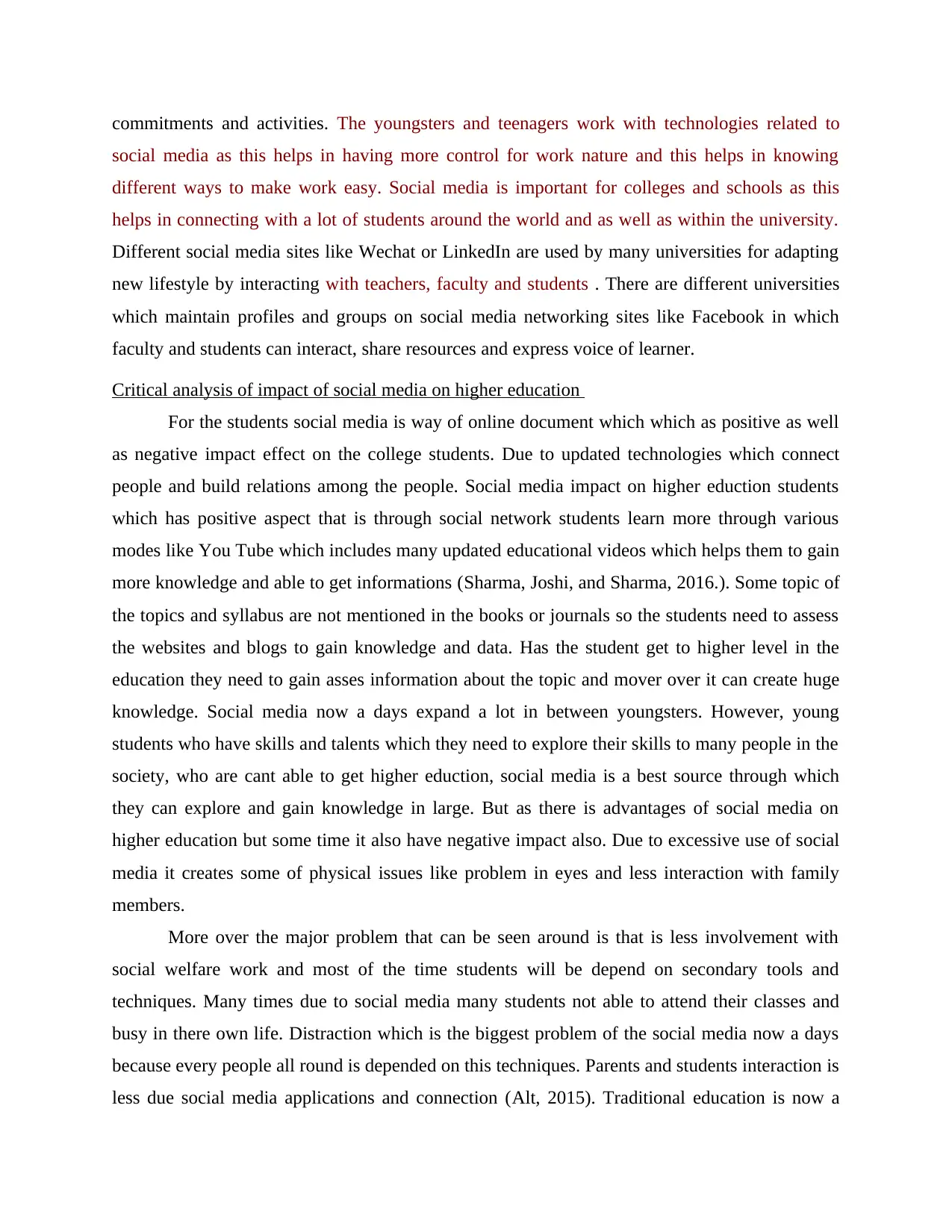
commitments and activities. The youngsters and teenagers work with technologies related to
social media as this helps in having more control for work nature and this helps in knowing
different ways to make work easy. Social media is important for colleges and schools as this
helps in connecting with a lot of students around the world and as well as within the university.
Different social media sites like Wechat or LinkedIn are used by many universities for adapting
new lifestyle by interacting with teachers, faculty and students . There are different universities
which maintain profiles and groups on social media networking sites like Facebook in which
faculty and students can interact, share resources and express voice of learner.
Critical analysis of impact of social media on higher education
For the students social media is way of online document which which as positive as well
as negative impact effect on the college students. Due to updated technologies which connect
people and build relations among the people. Social media impact on higher eduction students
which has positive aspect that is through social network students learn more through various
modes like You Tube which includes many updated educational videos which helps them to gain
more knowledge and able to get informations (Sharma, Joshi, and Sharma, 2016.). Some topic of
the topics and syllabus are not mentioned in the books or journals so the students need to assess
the websites and blogs to gain knowledge and data. Has the student get to higher level in the
education they need to gain asses information about the topic and mover over it can create huge
knowledge. Social media now a days expand a lot in between youngsters. However, young
students who have skills and talents which they need to explore their skills to many people in the
society, who are cant able to get higher eduction, social media is a best source through which
they can explore and gain knowledge in large. But as there is advantages of social media on
higher education but some time it also have negative impact also. Due to excessive use of social
media it creates some of physical issues like problem in eyes and less interaction with family
members.
More over the major problem that can be seen around is that is less involvement with
social welfare work and most of the time students will be depend on secondary tools and
techniques. Many times due to social media many students not able to attend their classes and
busy in there own life. Distraction which is the biggest problem of the social media now a days
because every people all round is depended on this techniques. Parents and students interaction is
less due social media applications and connection (Alt, 2015). Traditional education is now a
social media as this helps in having more control for work nature and this helps in knowing
different ways to make work easy. Social media is important for colleges and schools as this
helps in connecting with a lot of students around the world and as well as within the university.
Different social media sites like Wechat or LinkedIn are used by many universities for adapting
new lifestyle by interacting with teachers, faculty and students . There are different universities
which maintain profiles and groups on social media networking sites like Facebook in which
faculty and students can interact, share resources and express voice of learner.
Critical analysis of impact of social media on higher education
For the students social media is way of online document which which as positive as well
as negative impact effect on the college students. Due to updated technologies which connect
people and build relations among the people. Social media impact on higher eduction students
which has positive aspect that is through social network students learn more through various
modes like You Tube which includes many updated educational videos which helps them to gain
more knowledge and able to get informations (Sharma, Joshi, and Sharma, 2016.). Some topic of
the topics and syllabus are not mentioned in the books or journals so the students need to assess
the websites and blogs to gain knowledge and data. Has the student get to higher level in the
education they need to gain asses information about the topic and mover over it can create huge
knowledge. Social media now a days expand a lot in between youngsters. However, young
students who have skills and talents which they need to explore their skills to many people in the
society, who are cant able to get higher eduction, social media is a best source through which
they can explore and gain knowledge in large. But as there is advantages of social media on
higher education but some time it also have negative impact also. Due to excessive use of social
media it creates some of physical issues like problem in eyes and less interaction with family
members.
More over the major problem that can be seen around is that is less involvement with
social welfare work and most of the time students will be depend on secondary tools and
techniques. Many times due to social media many students not able to attend their classes and
busy in there own life. Distraction which is the biggest problem of the social media now a days
because every people all round is depended on this techniques. Parents and students interaction is
less due social media applications and connection (Alt, 2015). Traditional education is now a
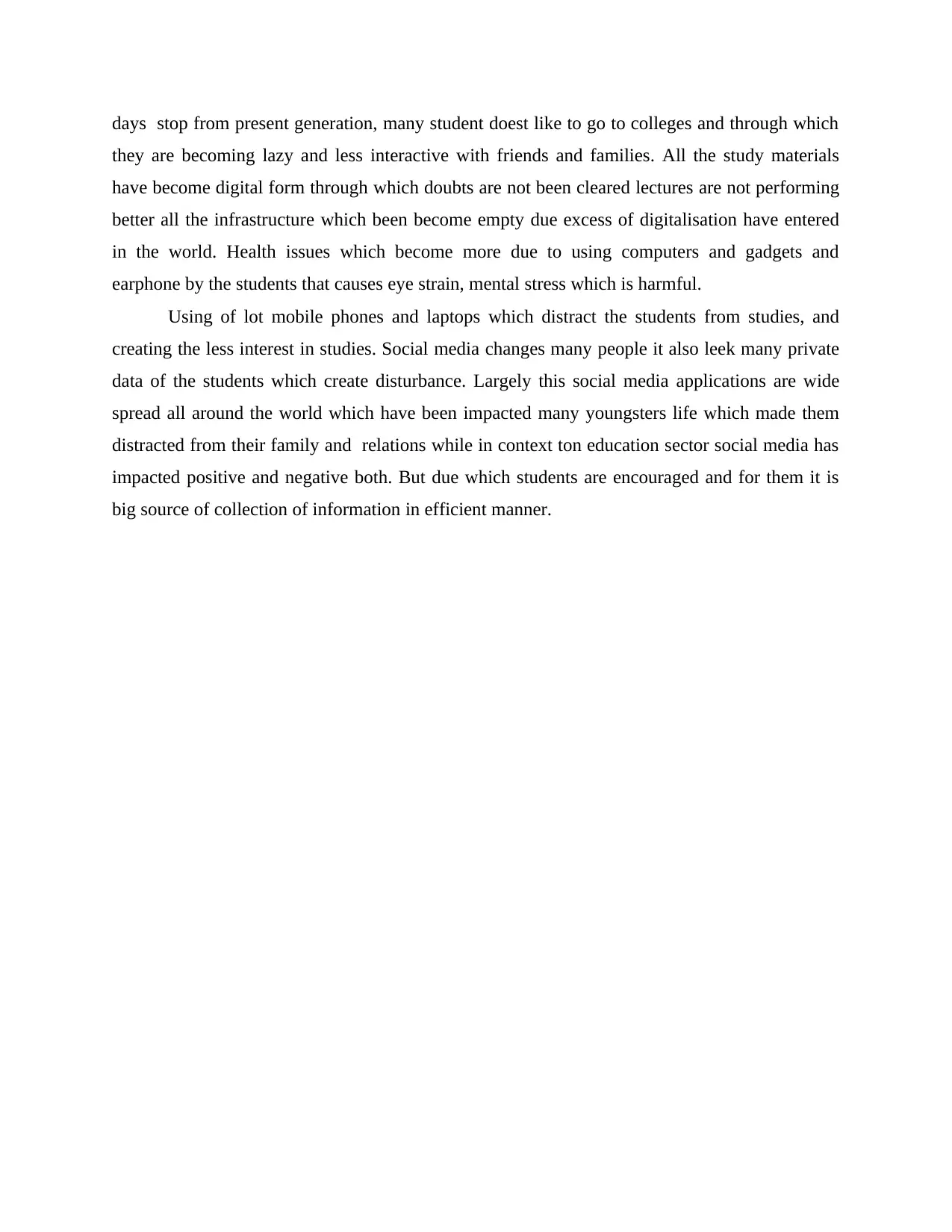
days stop from present generation, many student doest like to go to colleges and through which
they are becoming lazy and less interactive with friends and families. All the study materials
have become digital form through which doubts are not been cleared lectures are not performing
better all the infrastructure which been become empty due excess of digitalisation have entered
in the world. Health issues which become more due to using computers and gadgets and
earphone by the students that causes eye strain, mental stress which is harmful.
Using of lot mobile phones and laptops which distract the students from studies, and
creating the less interest in studies. Social media changes many people it also leek many private
data of the students which create disturbance. Largely this social media applications are wide
spread all around the world which have been impacted many youngsters life which made them
distracted from their family and relations while in context ton education sector social media has
impacted positive and negative both. But due which students are encouraged and for them it is
big source of collection of information in efficient manner.
they are becoming lazy and less interactive with friends and families. All the study materials
have become digital form through which doubts are not been cleared lectures are not performing
better all the infrastructure which been become empty due excess of digitalisation have entered
in the world. Health issues which become more due to using computers and gadgets and
earphone by the students that causes eye strain, mental stress which is harmful.
Using of lot mobile phones and laptops which distract the students from studies, and
creating the less interest in studies. Social media changes many people it also leek many private
data of the students which create disturbance. Largely this social media applications are wide
spread all around the world which have been impacted many youngsters life which made them
distracted from their family and relations while in context ton education sector social media has
impacted positive and negative both. But due which students are encouraged and for them it is
big source of collection of information in efficient manner.
⊘ This is a preview!⊘
Do you want full access?
Subscribe today to unlock all pages.

Trusted by 1+ million students worldwide
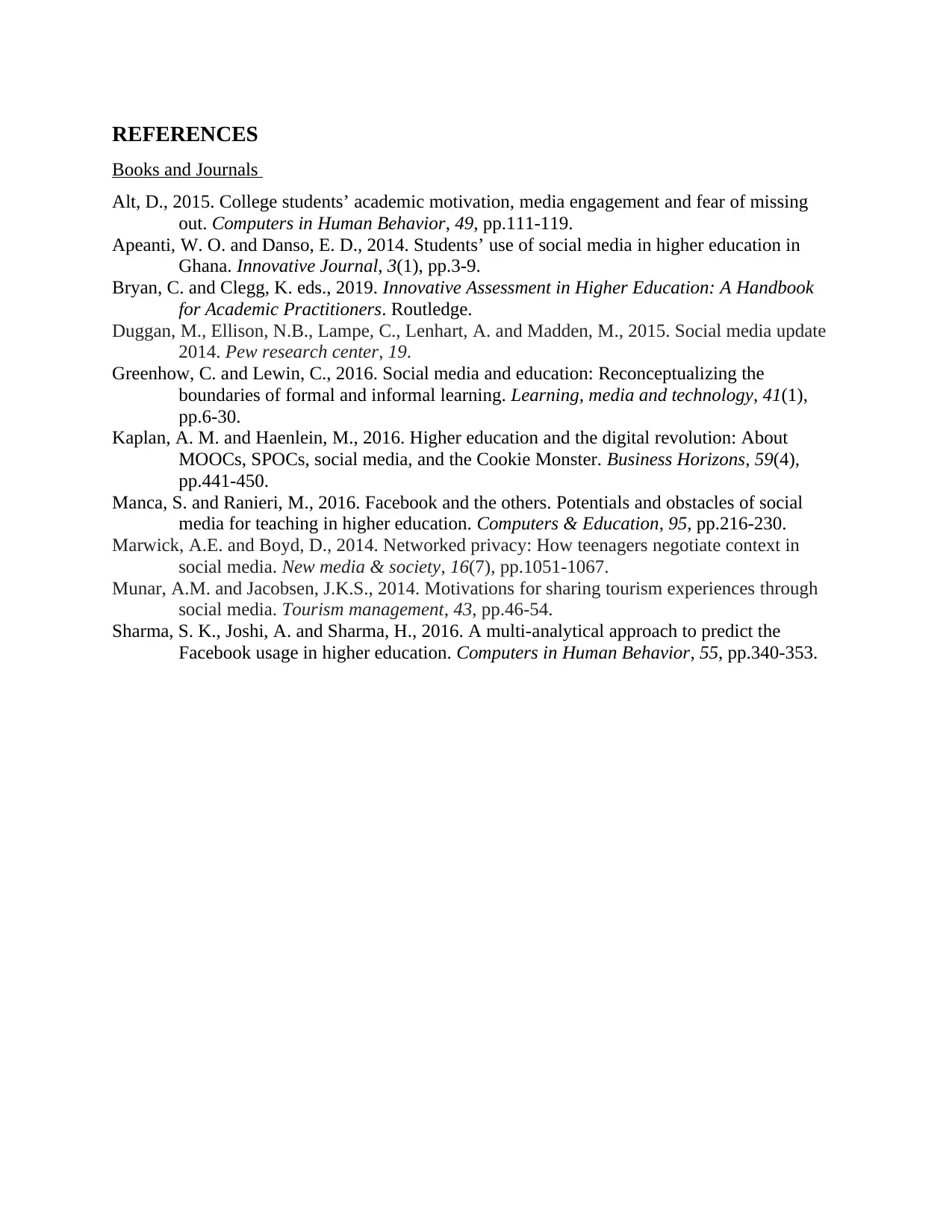
REFERENCES
Books and Journals
Alt, D., 2015. College students’ academic motivation, media engagement and fear of missing
out. Computers in Human Behavior, 49, pp.111-119.
Apeanti, W. O. and Danso, E. D., 2014. Students’ use of social media in higher education in
Ghana. Innovative Journal, 3(1), pp.3-9.
Bryan, C. and Clegg, K. eds., 2019. Innovative Assessment in Higher Education: A Handbook
for Academic Practitioners. Routledge.
Duggan, M., Ellison, N.B., Lampe, C., Lenhart, A. and Madden, M., 2015. Social media update
2014. Pew research center, 19.
Greenhow, C. and Lewin, C., 2016. Social media and education: Reconceptualizing the
boundaries of formal and informal learning. Learning, media and technology, 41(1),
pp.6-30.
Kaplan, A. M. and Haenlein, M., 2016. Higher education and the digital revolution: About
MOOCs, SPOCs, social media, and the Cookie Monster. Business Horizons, 59(4),
pp.441-450.
Manca, S. and Ranieri, M., 2016. Facebook and the others. Potentials and obstacles of social
media for teaching in higher education. Computers & Education, 95, pp.216-230.
Marwick, A.E. and Boyd, D., 2014. Networked privacy: How teenagers negotiate context in
social media. New media & society, 16(7), pp.1051-1067.
Munar, A.M. and Jacobsen, J.K.S., 2014. Motivations for sharing tourism experiences through
social media. Tourism management, 43, pp.46-54.
Sharma, S. K., Joshi, A. and Sharma, H., 2016. A multi-analytical approach to predict the
Facebook usage in higher education. Computers in Human Behavior, 55, pp.340-353.
Books and Journals
Alt, D., 2015. College students’ academic motivation, media engagement and fear of missing
out. Computers in Human Behavior, 49, pp.111-119.
Apeanti, W. O. and Danso, E. D., 2014. Students’ use of social media in higher education in
Ghana. Innovative Journal, 3(1), pp.3-9.
Bryan, C. and Clegg, K. eds., 2019. Innovative Assessment in Higher Education: A Handbook
for Academic Practitioners. Routledge.
Duggan, M., Ellison, N.B., Lampe, C., Lenhart, A. and Madden, M., 2015. Social media update
2014. Pew research center, 19.
Greenhow, C. and Lewin, C., 2016. Social media and education: Reconceptualizing the
boundaries of formal and informal learning. Learning, media and technology, 41(1),
pp.6-30.
Kaplan, A. M. and Haenlein, M., 2016. Higher education and the digital revolution: About
MOOCs, SPOCs, social media, and the Cookie Monster. Business Horizons, 59(4),
pp.441-450.
Manca, S. and Ranieri, M., 2016. Facebook and the others. Potentials and obstacles of social
media for teaching in higher education. Computers & Education, 95, pp.216-230.
Marwick, A.E. and Boyd, D., 2014. Networked privacy: How teenagers negotiate context in
social media. New media & society, 16(7), pp.1051-1067.
Munar, A.M. and Jacobsen, J.K.S., 2014. Motivations for sharing tourism experiences through
social media. Tourism management, 43, pp.46-54.
Sharma, S. K., Joshi, A. and Sharma, H., 2016. A multi-analytical approach to predict the
Facebook usage in higher education. Computers in Human Behavior, 55, pp.340-353.
1 out of 7
Related Documents
Your All-in-One AI-Powered Toolkit for Academic Success.
+13062052269
info@desklib.com
Available 24*7 on WhatsApp / Email
![[object Object]](/_next/static/media/star-bottom.7253800d.svg)
Unlock your academic potential
Copyright © 2020–2026 A2Z Services. All Rights Reserved. Developed and managed by ZUCOL.





